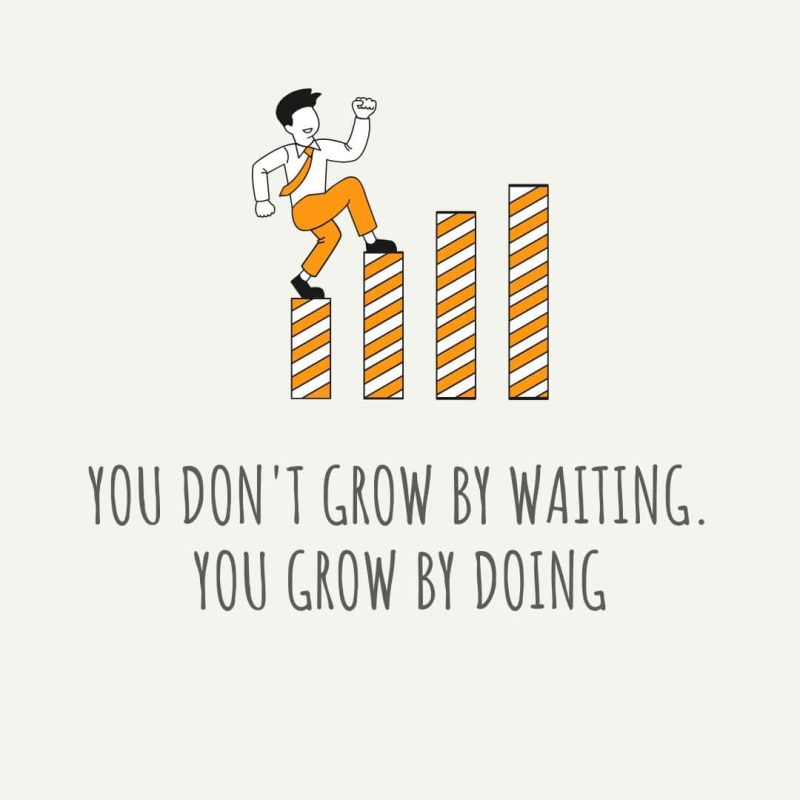Read the most powerful quotes from James Clear’s “Atomic Habits” and learn how to build good habits, break bad ones, and master the small behaviours that lead to remarkable results.
James Clear’s “Atomic Habits” is more than just a guide to habit formation; it’s a blueprint for transforming your life through small, consistent changes. In this post, we share the most impactful quotes from the book ‘Atomic Habits’ and delve into the lessons they hold.
Whether you’re striving to build new habits, break old ones, or simply understand the science behind behaviour change, these quotes with easy-to-understand explanations will guide you every step of the way.
Unlocking the Wisdom of “Atomic Habits”: Key Quotes and Lessons
Before we dive into the quotes, let’s understand that each one represents a fundamental principle of habit formation. These principles are simple yet powerful, offering a clear path to make lasting changes.
1. “You do not rise to the level of your goals. You fall to the level of your systems.”
This quote emphasizes the importance of building systems rather than solely focusing on setting goals. Goals are great for setting direction, but the systems you put in place determine whether or not you reach them. For example, if your goal is to read more books, your system might include setting aside 20 minutes each morning for reading. By focusing on these daily practices, you create a sustainable path to achieve your larger goals. Atomic habits are the building blocks of these systems; small, consistent actions can lead to big results over time.
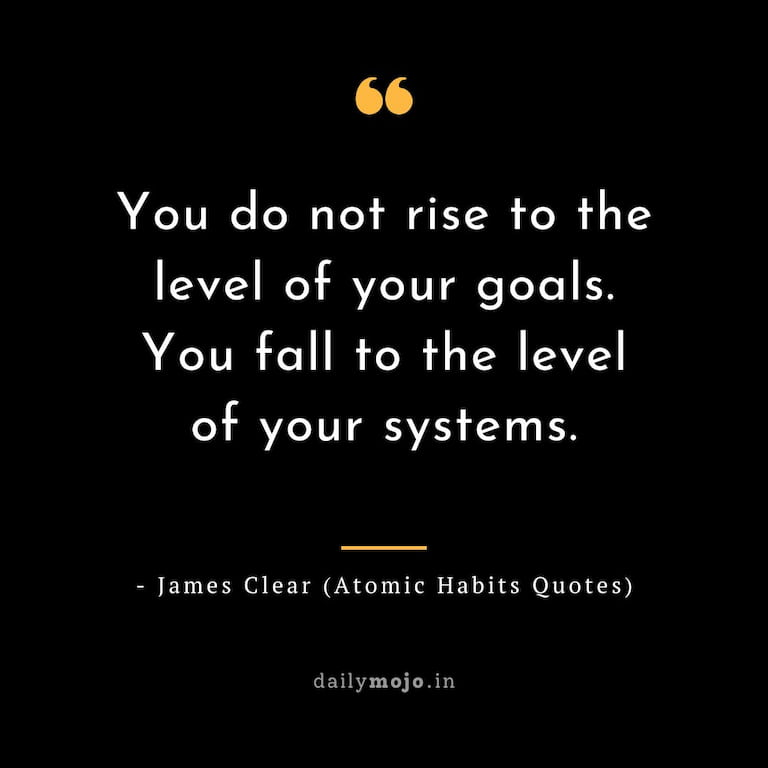
2. “Habits are the compound interest of self-improvement.”
This quote likens habits to compound interest—small, consistent actions that accumulate over time to create significant change. Just as small amounts of money invested consistently grow exponentially due to compound interest, small daily habits build up to create remarkable results in your life. Whether it’s exercising, reading, or practicing a new skill, even minor improvements, when compounded, can lead to substantial personal growth. The key is to remain patient and trust the process. Remember, the changes may seem insignificant at first, but over months and years, they can lead to transformative outcomes.
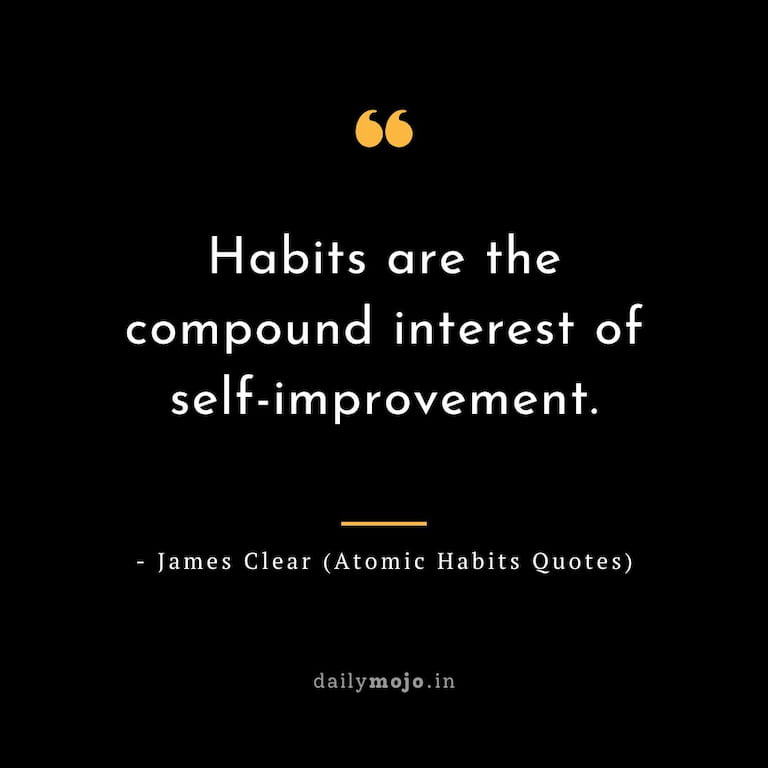
3. “The most effective way to change your habits is to focus not on what you want to achieve, but on who you wish to become.”
Rather than concentrating on specific outcomes (like losing weight or earning more money), this quote encourages you to think about your desired identity. For example, instead of saying, “I want to run a marathon,” focus on becoming a person who values fitness and endurance. By aligning your habits with your identity, your actions become a reflection of who you want to be. This shift in perspective is powerful because it aligns your daily behaviors with your deeper values, making it easier to stay committed to your habits over the long term.
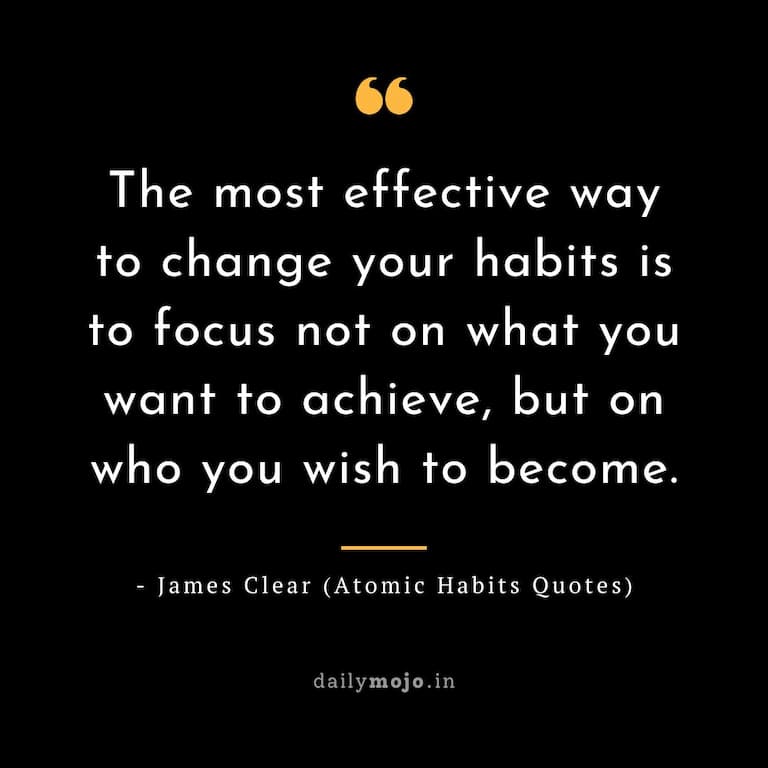
4. “Environment is the invisible hand that shapes human behavior.”
Your environment plays a crucial role in habit formation. This quote highlights that our surroundings often dictate our actions, consciously or subconsciously. For instance, if you want to eat healthier, rearranging your kitchen so that fruits and vegetables are more visible and accessible can encourage better eating habits. Similarly, creating a workspace free from distractions can boost productivity. By strategically designing your environment to support positive habits, you make it easier to stick to those habits and reduce the friction that might lead to negative ones.
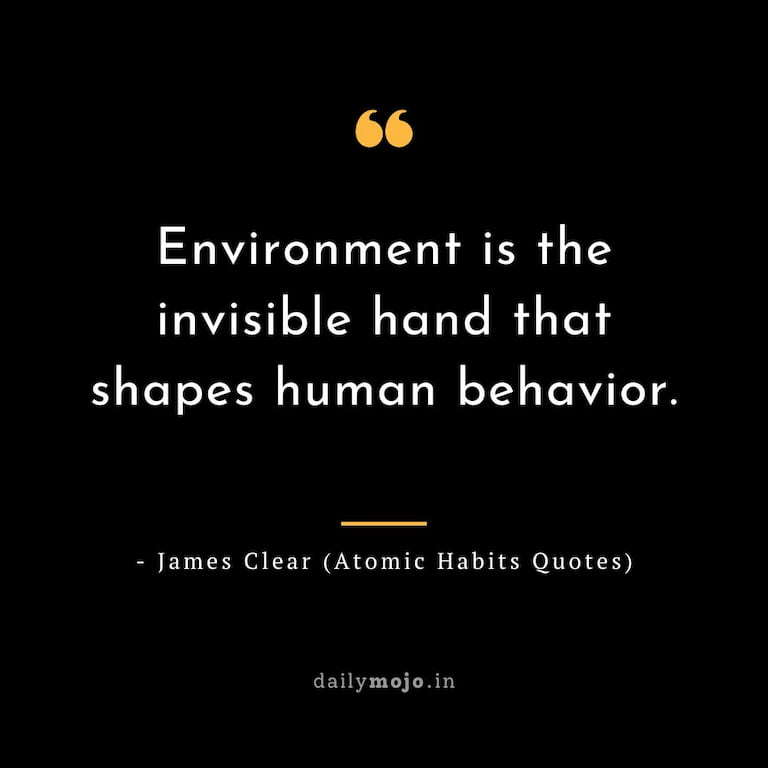
5. “Success is the product of daily habits—not once-in-a-lifetime transformations.”
Many people look for big, dramatic changes to achieve success, but this quote reinforces that success is built through small, consistent actions taken every day. Instead of waiting for a perfect moment or a major breakthrough, focus on improving just 1% every day. These small improvements may seem insignificant at first, but over time, they compound to produce remarkable outcomes. Consistency is the key. Focus on building good habits and make them a natural part of your daily routine; this approach will eventually lead you to success.
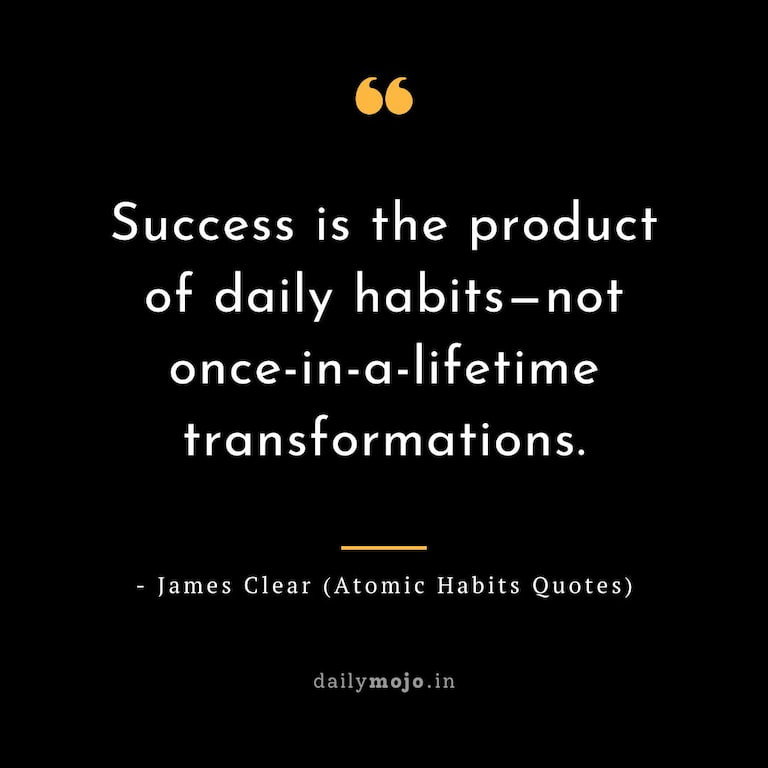
6. “The purpose of setting goals is to win the game. The purpose of building systems is to continue playing the game.”
Goals give you a direction, but systems are what keep you on the path for the long term. Winning the game (reaching a goal) is great, but continuing to play (maintaining progress) is more important for sustained success. For example, losing weight might be your goal, but creating a sustainable diet and exercise routine is your system. Once the goal is achieved, the system ensures that you maintain the progress. This mindset helps prevent burnout and ensures lasting change.
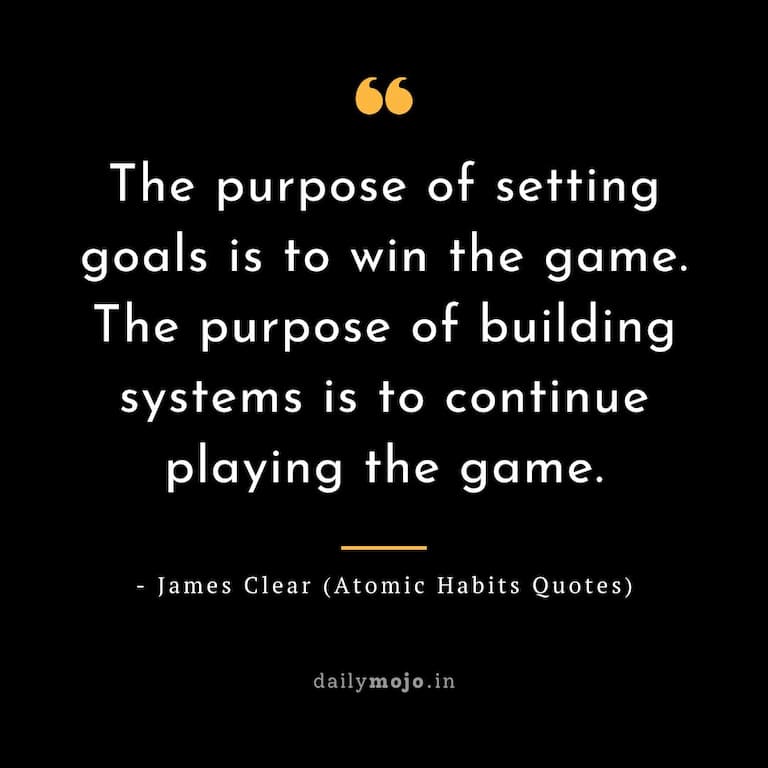
7. “You should be far more concerned with your current trajectory than with your current results.”
This quote urges you to focus on your path and the direction in which you are headed rather than immediate results. For instance, if you aim to improve your fitness, don’t be disheartened if you don’t see instant results. Instead, pay attention to the positive habits you are building, like working out regularly and eating healthily. Over time, these habits will lead to the desired outcomes. Short-term results can be misleading, but a positive trajectory ensures long-term success.
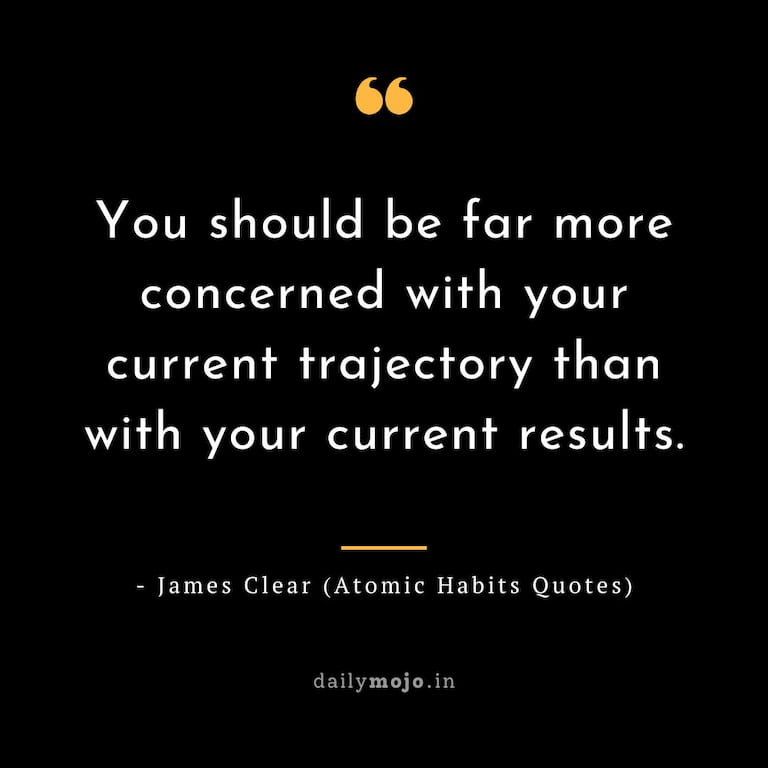
8. “The secret to getting results that last is to never stop making improvements.”
This quote emphasizes the importance of continuous improvement, or what James Clear refers to as the “1% rule.” Instead of aiming for perfection, aim for progress. Incremental improvements might seem insignificant in the short term, but they accumulate over time to create substantial changes. The idea is to always seek ways to refine, optimize, and enhance your habits. Whether it’s improving your work processes, fitness routines, or personal development habits, the goal should be to make small, ongoing improvements. This mindset keeps you from stagnating and ensures that you are always moving forward, no matter how small the steps.
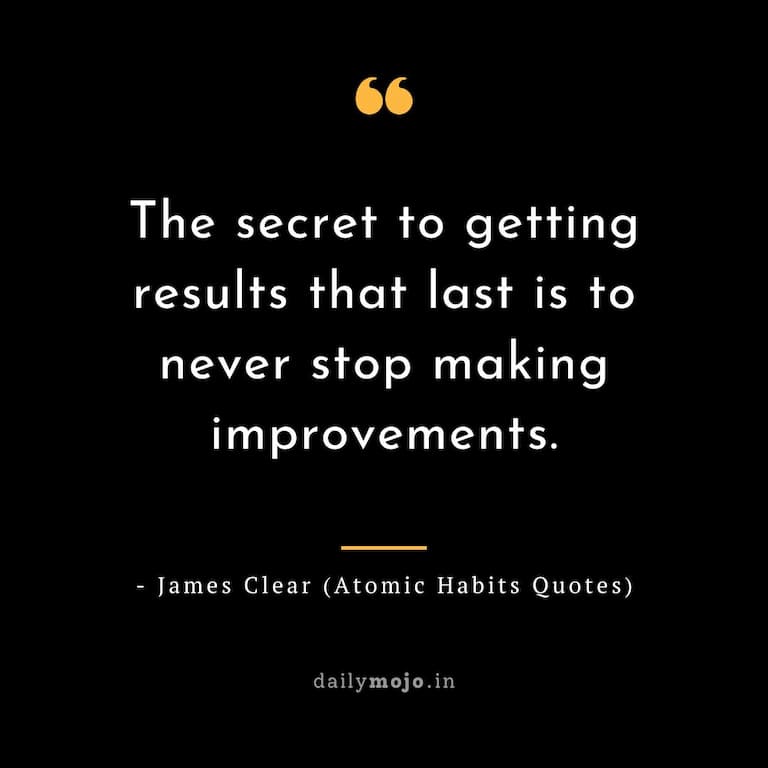
9. “Every action you take is a vote for the type of person you wish to become.”
Each choice you make, no matter how small, contributes to the person you are becoming. If you consistently choose to eat healthily, exercise, or focus on your goals, you are casting votes for a healthier, more disciplined self. Conversely, choices that go against your desired identity (like skipping workouts or procrastinating) are votes in the opposite direction. You don’t need to be perfect, but the more positive votes you cast, the closer you get to becoming the person you aspire to be. This perspective encourages consistency and helps you see the value in every small, positive action.
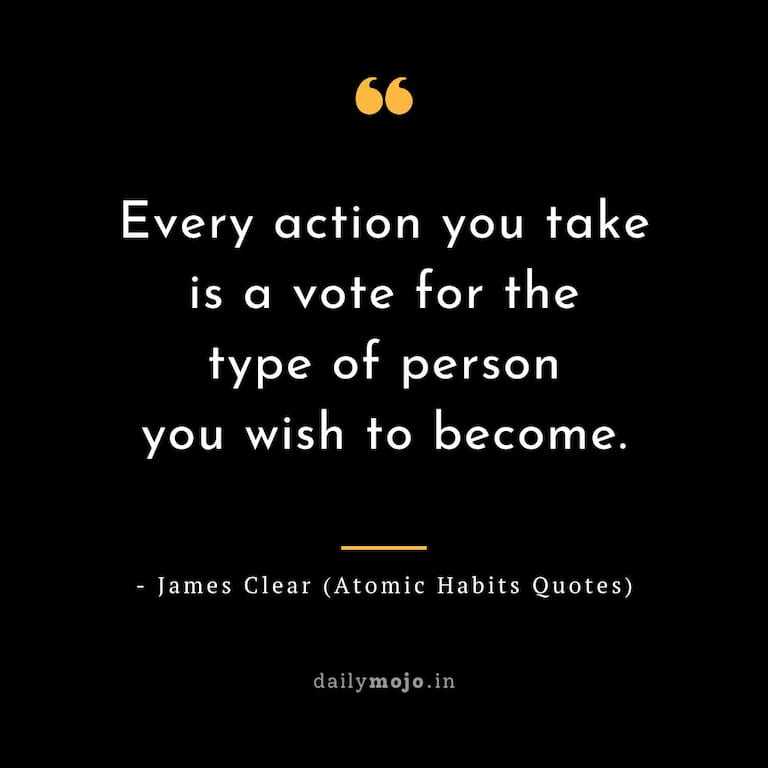
10. “Make it obvious, make it attractive, make it easy, make it satisfying.”
This quote outlines the four laws of behaviour change that James Clear introduces in “Atomic Habits.” To build a good habit, make it obvious by placing cues in your environment; make it attractive by associating it with something positive; make it easy by breaking it down into small steps; and make it satisfying by providing a reward or positive reinforcement. By following these four laws, you create an environment and a routine that supports positive habit formation, making it easier to integrate new behaviors into your daily life.
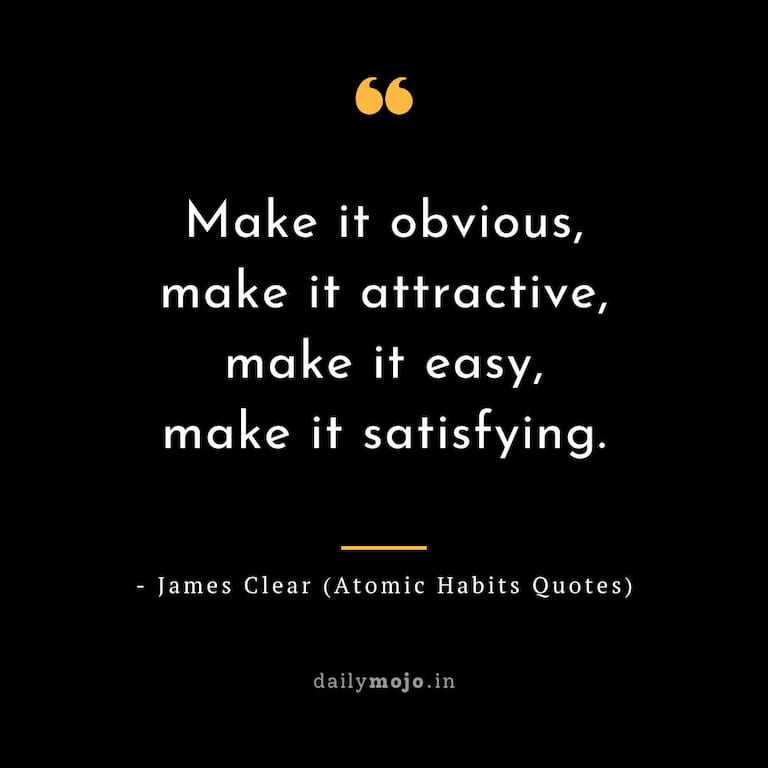
11. “The greatest threat to success is not failure but boredom.”
Often, people start new habits with enthusiasm, but as time goes on, the initial excitement fades, and boredom sets in. This quote highlights the importance of pushing through the dull moments. True mastery and long-term success come from sticking with habits even when they are no longer exciting. For example, if you want to learn a new language, the thrill of starting can quickly wear off. It’s the commitment to continue practicing daily, even when it feels mundane, that leads to fluency. Embrace the boredom and see it as a sign that you’re on the right path.
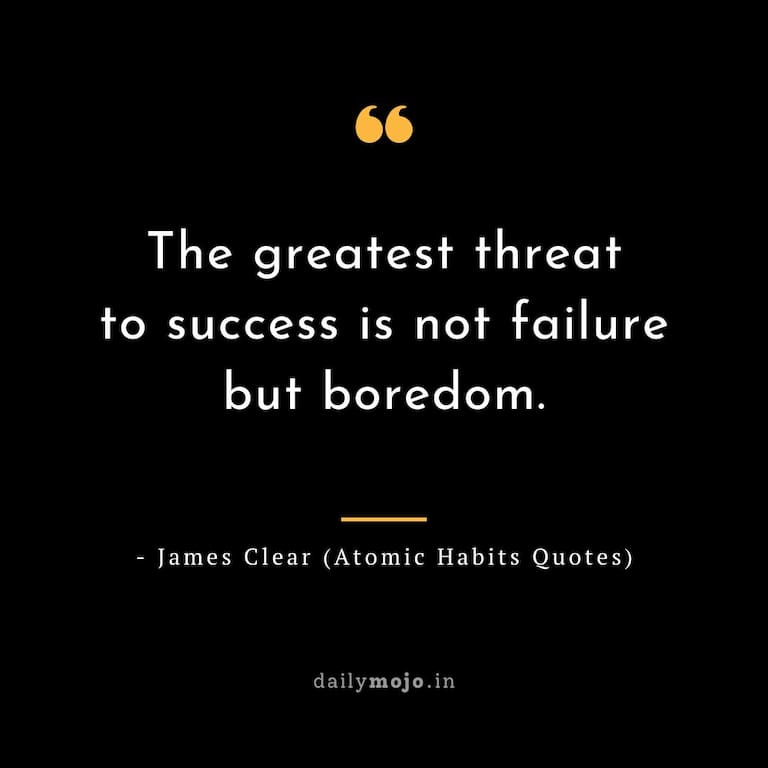
12. “To master a habit, start with repetition, not perfection.”
When developing a new habit, the focus should initially be on consistency and repetition rather than perfect execution. It’s more important to show up and perform the habit regularly than to do it perfectly every time. For example, if you want to start a daily writing habit, aim to write a little bit every day rather than trying to write a masterpiece from the start. Over time, consistency will lead to improvement. This approach reduces pressure and helps make the habit stick by lowering the barrier to entry.
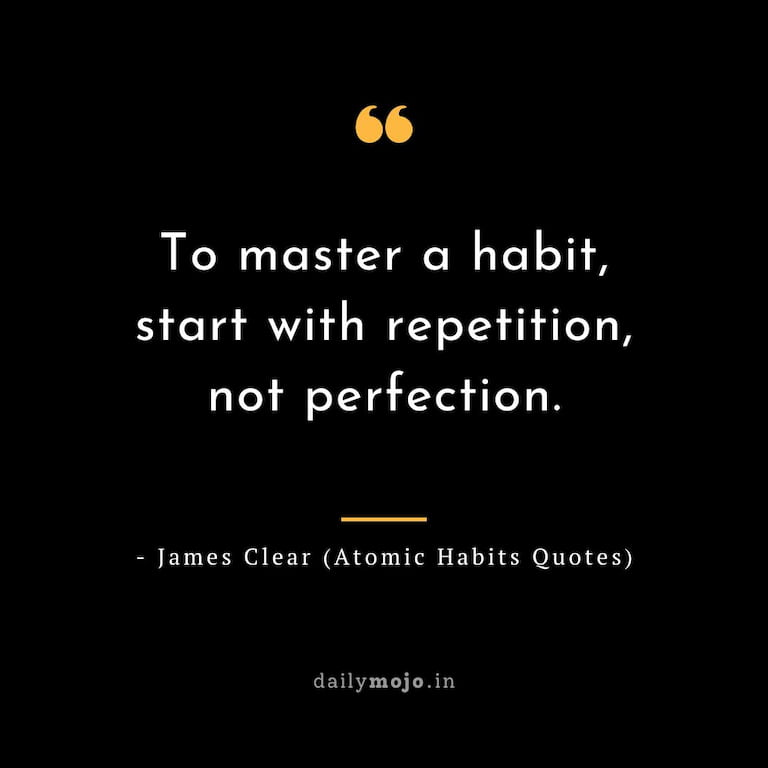
13. “The more you ritualize the beginning of a process, the more likely it becomes that you can slip into the state of deep focus that is required to do great things.”
This quote suggests that by creating a ritual or routine at the beginning of a task, you make it easier to achieve a state of deep focus and flow. For example, if you start every writing session by organizing your desk, setting a timer, and brewing a cup of tea, these small actions serve as a signal to your brain that it’s time to focus. Over time, these rituals become automatic triggers that help you enter a productive mindset faster, making it easier to perform at your best.
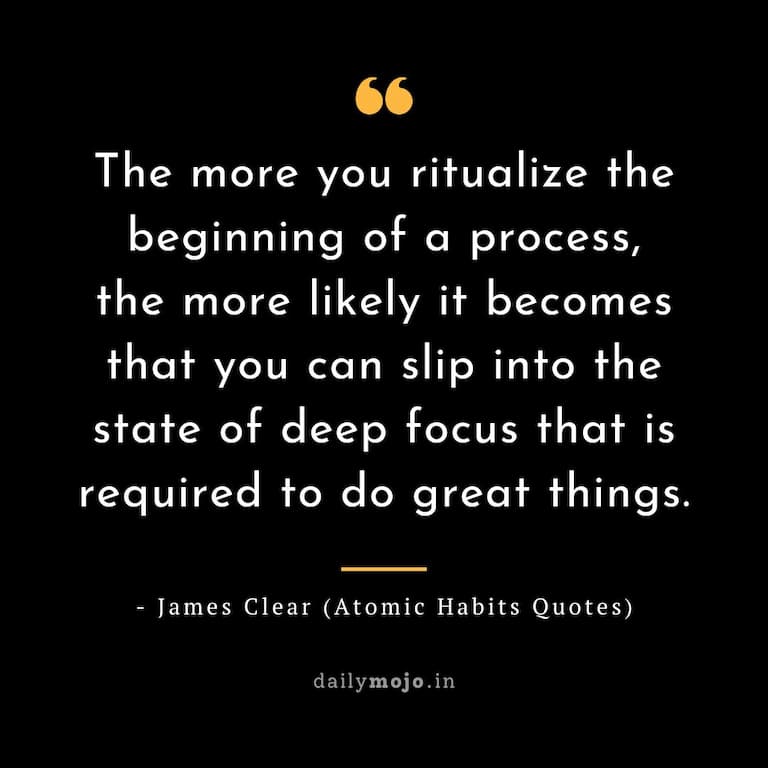
14. “Reduce friction. Optimize the environment.”
This quote emphasizes the importance of minimizing obstacles that prevent you from adopting good habits. By reducing friction—making it easier to do what’s good for you—you are more likely to stick with new behaviors. For example, if you want to go running every morning, lay out your running clothes the night before. If you want to read more, keep a book by your bedside. These small changes in your environment can make a big difference in your ability to maintain new habits, as they remove barriers and make it more convenient to perform desired behaviors.
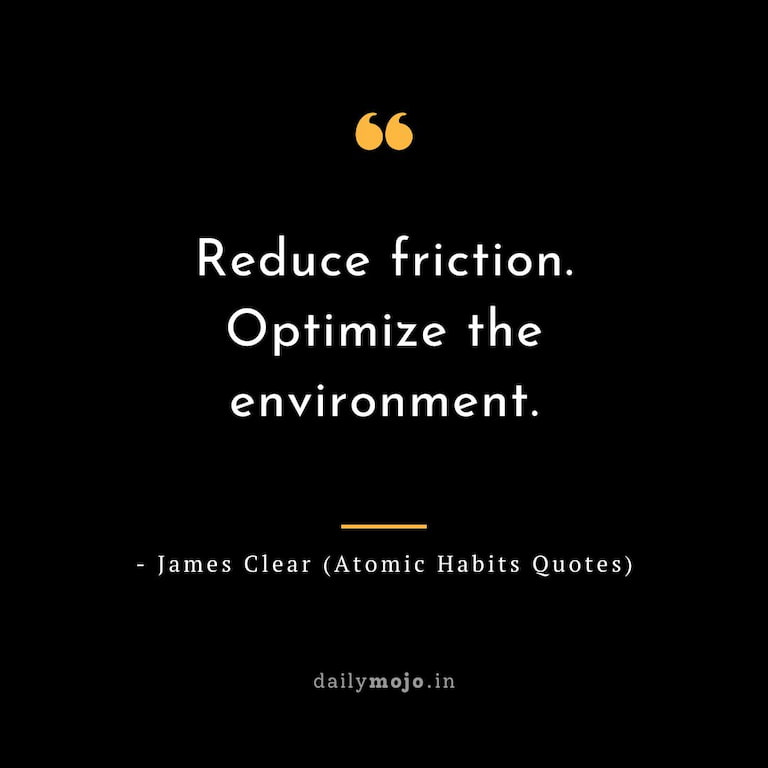
15. “Standardize before you optimize.”
Before you focus on making a habit more efficient or perfect, it’s essential to establish it as a regular part of your routine. This quote advises you to standardize the behavior first—meaning, make it a regular, consistent part of your life—before worrying about optimizing it. For instance, if your goal is to exercise more, first focus on showing up at the gym regularly before fine-tuning your workout routine. Once the habit is stable, you can then look for ways to improve or optimize it for better results.
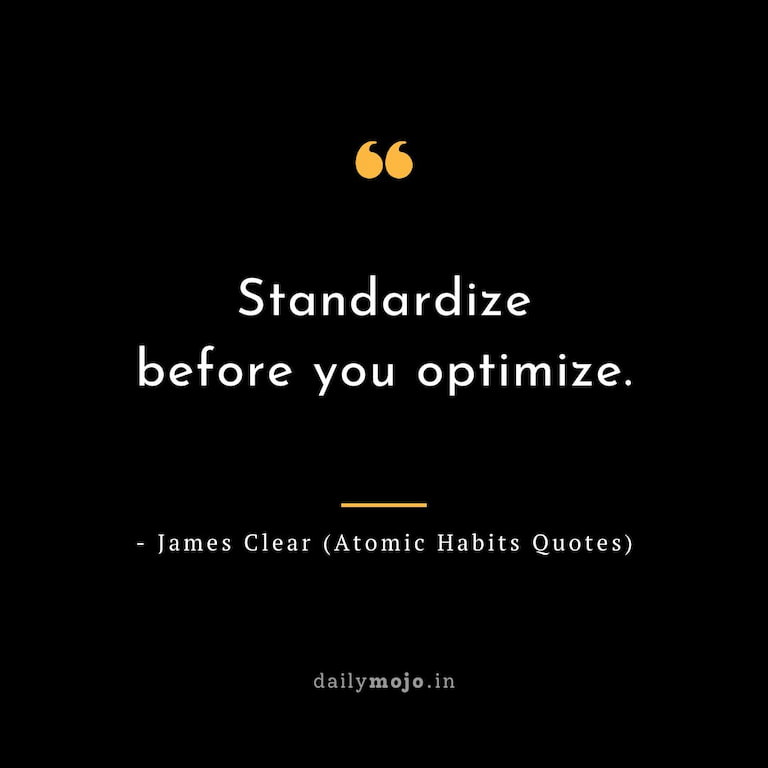
16. “The two-minute rule: When you start a new habit, it should take less than two minutes to do.”
This rule suggests that when you’re starting a new habit, it should be easy and quick to initiate—something you can accomplish in just two minutes or less. This approach lowers the resistance to starting the habit and helps establish it as a consistent part of your routine. For example, if you want to start a habit of running, begin by putting on your running shoes and stepping outside for two minutes. Over time, this minimal commitment builds momentum, and you’ll find it easier to extend the activity.
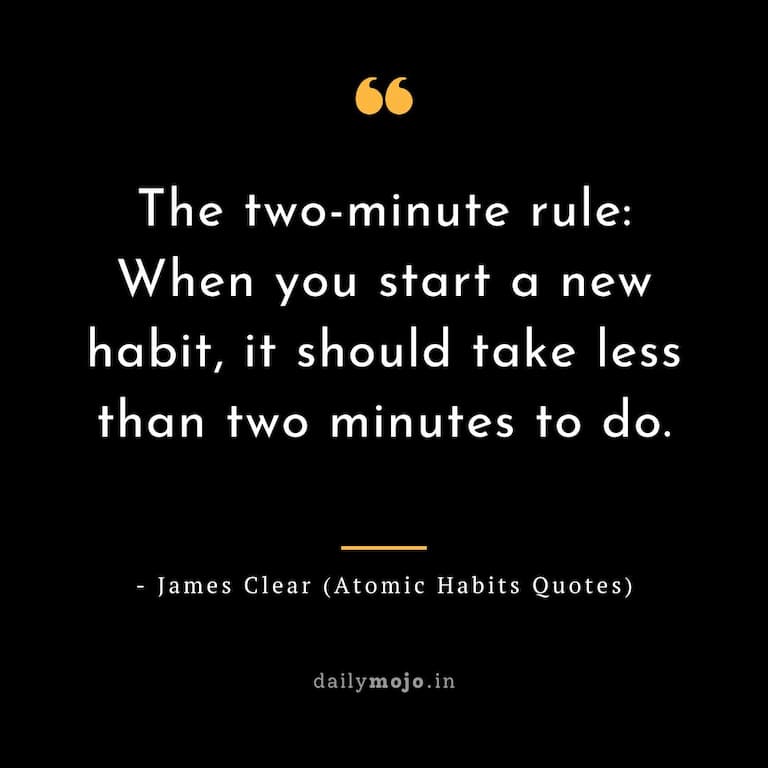
17. “Habits form based on frequency, not time.”
This quote emphasizes that the number of times you perform a habit matters more than how long you have been trying to form it. It’s the repetition that reinforces the behaviour, helping it become automatic over time. For instance, if you want to develop a habit of practicing a musical instrument, practicing daily for a few minutes will be more effective in ingraining the habit than practicing for an hour once a week. Repeated exposure is what makes the brain recognize the behaviour as a habit.
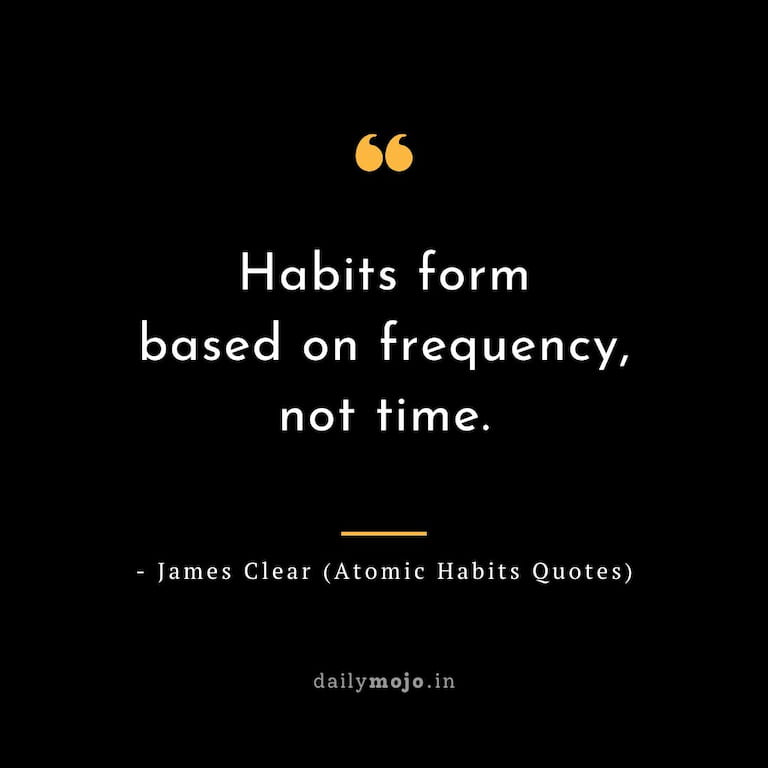
18. “The most practical way to change who you are is to change what you do.”
Identity-based habits involve focusing on who you wish to become rather than on specific actions or goals. If you want to become a writer, start by writing daily, even if it’s just a small amount. If you want to be a fit person, make choices that a fit person would make, such as exercising regularly and eating healthily. By consistently performing actions that align with your desired identity, you gradually begin to embody that identity.
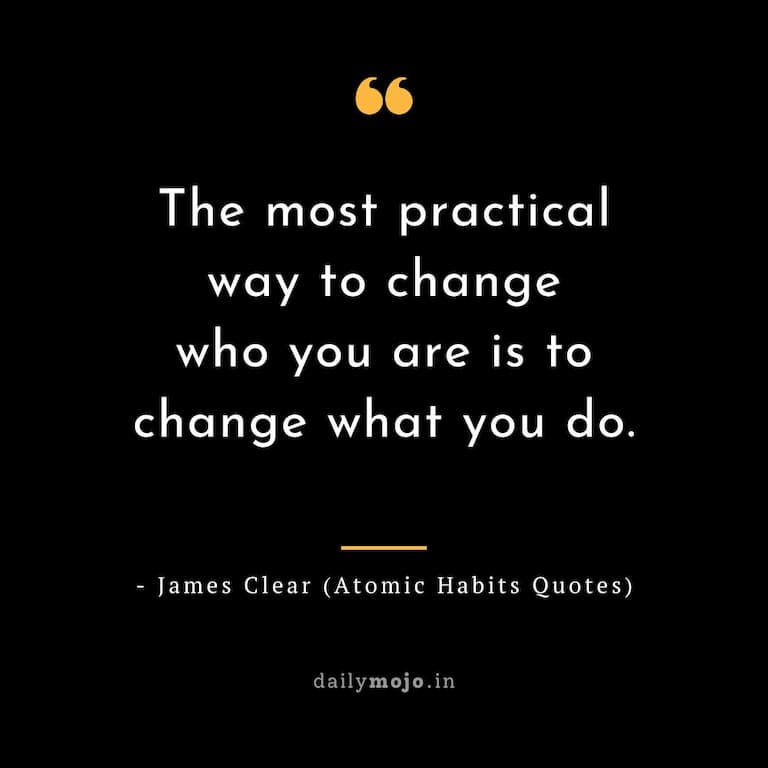
19. “Motivation is overrated; environment often matters more.”
This quote underscores the idea that while motivation can get you started, the environment often has a more significant impact on sustaining habits. Creating an environment that supports your desired behaviors can help reduce reliance on willpower and motivation. For instance, if you want to reduce screen time, removing apps from your phone or keeping your phone in another room can be more effective than relying solely on self-discipline. Shaping your environment to minimize triggers for bad habits and enhance cues for good ones can be a game-changer.
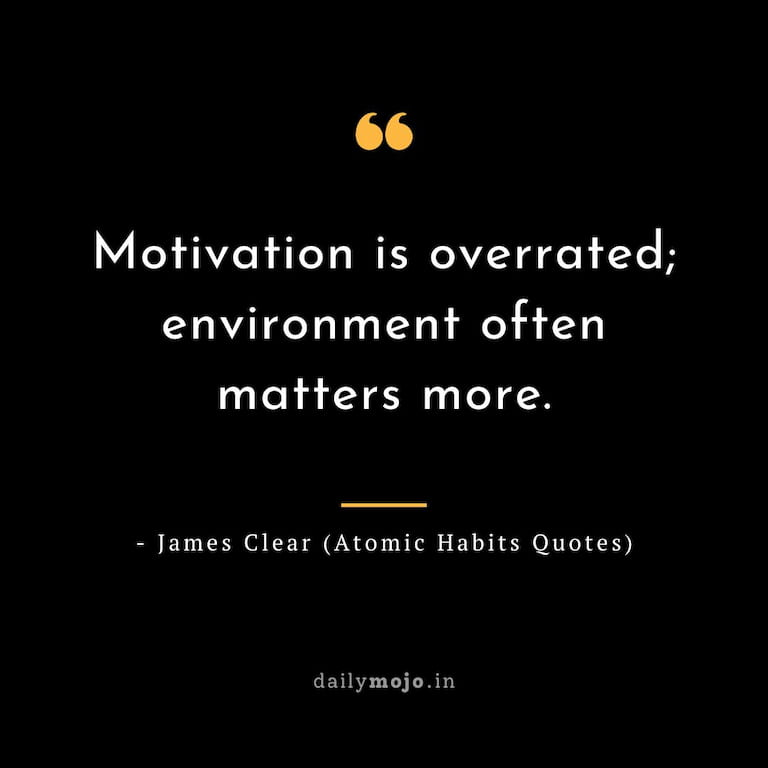
20. “If you want better results, then forget about setting goals. Focus on your system instead.”
This idea goes hand in hand with the emphasis on systems over goals. Instead of concentrating solely on the end result (like losing weight or saving money), focus on the daily routines and processes that lead to those results. For example, rather than setting a goal to save $1,000, create a system where you automatically transfer a small amount of money to your savings account each week. Systems are actionable, repeatable, and adaptable, making them more effective than goals alone in creating long-term change.
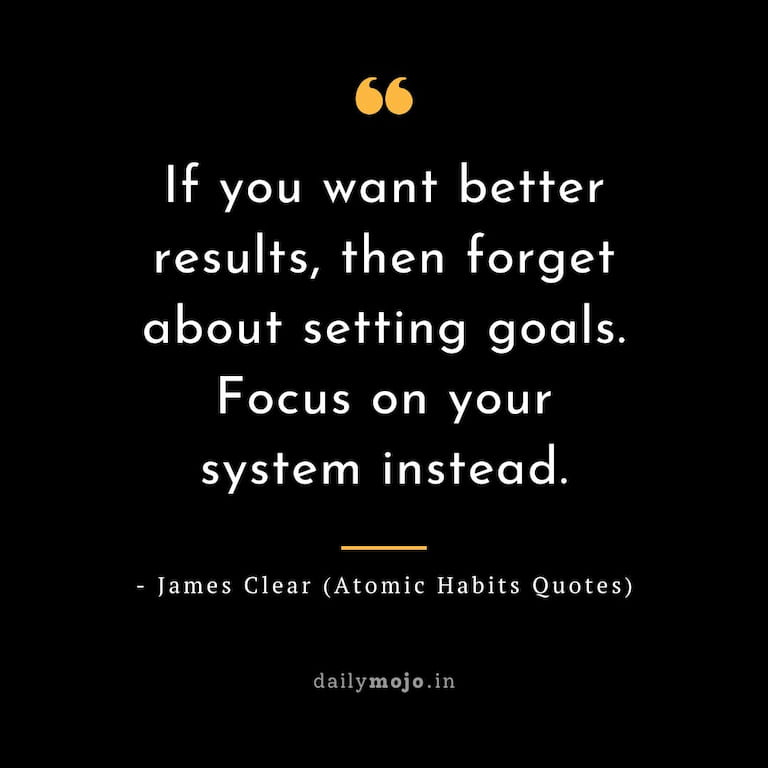
21. “The first mistake is never the one that ruins you. It is the spiral of repeated mistakes that follows.”
Mistakes are inevitable, but it’s crucial not to let one slip-up derail your progress. The problem arises when a single mistake leads to a cycle of negative behaviour. For example, missing one workout isn’t a problem, but letting that one miss turn into a week of inactivity can hinder your progress. The key is to treat mistakes as a normal part of the process and focus on getting back on track quickly rather than letting them spiral out of control.
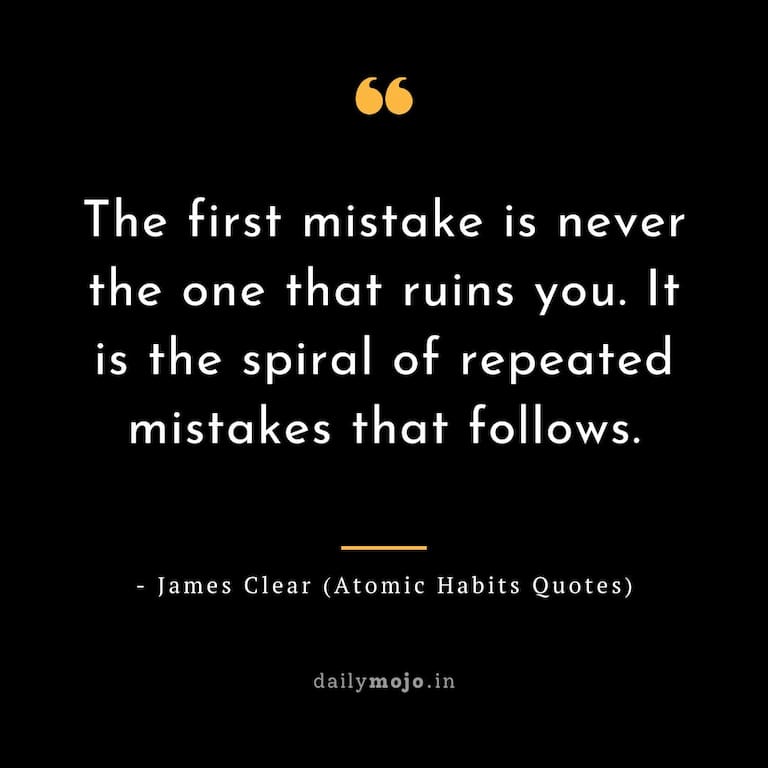
Conclusion
The book ‘Atomic Habits’ by James Clear teaches us that small changes lead to big results. By focusing on these key lessons, you can transform your habits and, ultimately, your life.
Share this post with anyone who might benefit from these insights, and start building your atomic habits today!

